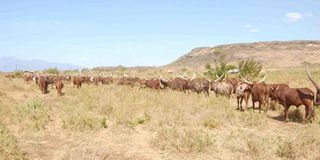Makerere University sets up climate centre

As the effects of climate change continue to be felt, there is need for partnerships among various stakeholders to address the challenges faced by farmers. FILE PHOTO
In line with the Sustainable Development Goal, which focuses on combating climate change and its impact, different partners in different countries are implementing various projects.
There is the school of thought that Africa could utilise the opportunity of combating climate change effects by selling carbon credits, but a number of experts think differently.
Although they agree that there are opportunities, but the continent is also under threat, therefore the need to devise ways to combat it. And like other Sub-Saharan Africa countries, Uganda is already affected by climate change.
Strengthen capacity
With most of the population and economy largely dependent on natural resources—mainly rainfed agriculture, fisheries, forestry and tourism—climate change will adversely affect Uganda. The situation is compounded by lack of technical capacity.
Against this backdrop, Makerere University College of Agriculture and Environmental Sciences (CAES) runs projects for students and communities in East Africa as well as outreach programmes.
In 2009, when the Rockefeller Foundation called for proposals to strengthen capacity in Eastern Africa to deal with climate change-related challenges, the College submitted a proposal.
It is titled “Strengthening East African Resilience and Climate Change Adaptation Capacity through Training, Research and Policy Interventions”. It was approved for funding.
Specifically, the project was to enable Makerere University to form an advisory panel on climate change and ensure interdisciplinary research and participation across the university as well as review curricular to include climate sciences.
Centre of excellence
Subsequently, a centre—Makerere University Climate Change Research and Innovations (Muccri)—was set up at the College.
There is a team leader and team that consults different stakeholders to propose ideas on how best they can implement the programme.
Prof Bernard Bashasha, the principal, CAES, in giving overview of this initiative explained that the College has the capacity to tackle climate change issues.
It offers courses related to crop and animal production, agribusiness and economics, agricultural engineering, geography and forestry among others. There are also specialised centres such as waste management control at Makerere University Agricultural Research Institute Kabanyolo (Muarik).
“The College is capable of building students’ capacity to reach out to farming communities affected by climate change. Mucrri intends to be the centre of excellence for climate science,” he says.
Students studying agriculture-related courses are carrying out case studies concerning effects of drought, landsides in Eastern Uganda (especially in Bududa, Manafwa and Mbale districts), and use of wetlands by farmers growing mainly lowland rice.
They have also been documenting the information disseminated to farming communities.
Dr Revocatus Twinomuhangi, the interim coordinator, the Centre explains that in handling challenges faced by farmers arising from climate change, scientists must consider sensitising the farming communities about proper use of agricultural and natural resources.
Scientists at Makerere University can collaborate with their counterparts in the National Research Organisation (Naro) to test drought-tolerant crops with communities in various regions. Already, some crops are with farmers like the coffee varieties resilient to drought.
Under the interim structure, the team has been able to review the curriculum to include climate science subjects. Teaching materials have been developed, including those for early warning systems were collection of information on weather patterns has been packaged in collaboration with the meteorological department, ministry of Agriculture.
This information will be disseminated to the farming communities to help them plan when to plant depending on the weather patterns.
Joint effort
In his key note address during the launch of the project last year, Paul Isabirye, assistant commissioner, Ministry of Water and Environment, commended the College for being responsive to climate change issues.
He pointed out that climate change was already disrupting the Earth’s ecological systems. With this, there are potential serious negative consequences for agricultural production, forests, water supply, health systems and overall human development. But the vulnerable populations are poorly equipped to cope.
He added that as temperatures throughout East Africa rise, precipitation is expected to increase, along with frequency and intensity of extreme events such as droughts floods, heatwaves and associated impacts.
Isabirye warned that the rate of impact is likely to be more rapid than previously expected with changes in rainfall and temperatures. This will alter the ecological range of plants and animals forcing some species to migrate, disrupting delicate ecosystems and increasing extinctions.
This will affect all sectors of the economy but more seriously the socio-economic wellbeing of the population. Therefore, there is the need for a joint effort to address climate change.




